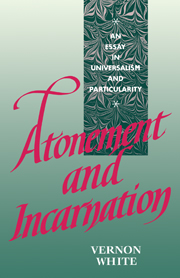Book contents
- Frontmatter
- Contents
- Introduction
- 1 The claim
- 2 On having lived too long and seen too much
- 3 The work of Christ (On trying to conceive how ‘things are not as they were’)
- 4 Two recent contributions
- 5 Creating an atonement model
- 6 The person of Christ (On trying to conceive how the Word became Flesh)
- 7 A moral demand: conditions for real reconciliation
- 8 Anthropocentricity, imperialism, and evangelism: an ethical postscript
- Notes
- Bibliography
- Index
2 - On having lived too long and seen too much
Published online by Cambridge University Press: 21 September 2009
- Frontmatter
- Contents
- Introduction
- 1 The claim
- 2 On having lived too long and seen too much
- 3 The work of Christ (On trying to conceive how ‘things are not as they were’)
- 4 Two recent contributions
- 5 Creating an atonement model
- 6 The person of Christ (On trying to conceive how the Word became Flesh)
- 7 A moral demand: conditions for real reconciliation
- 8 Anthropocentricity, imperialism, and evangelism: an ethical postscript
- Notes
- Bibliography
- Index
Summary
The pressure against a traditional soteriological claim I wish to deal with here is the point already alluded to in the introduction. Human history and pre-history is longer than we thought. It reaches back across far greater tracts of time than our forebears realized. Creation myths, aetiological legends, and beguiling genealogies masked the true extent of our origins. We have lived a long time, yet all this time, inhabited by all those people, seems to have been untouched by Christ – at least as far as any evident, acknowledged, empirical criteria are concerned.
We also see further around us in the present. The explosion of transport and travel which has been unleashed on the Christian world in modern times has introduced us to a vastly populated array of non-Christian cultures – each with their own long history – in which, again, there appears little or no acknowledged evidence of the influence of the Christ event.
It is a bitter irony for the traditional Christian claim. Because of this ever increasing access to wider and wider areas of history and geography a concept of universal history has become more and more thinkable – but at the very same time the idea that it could be determined and dominated by anything as particular as the Christ event becomes less thinkable.
- Type
- Chapter
- Information
- Atonement and IncarnationAn Essay in Universalism and Particularity, pp. 15 - 25Publisher: Cambridge University PressPrint publication year: 1991

